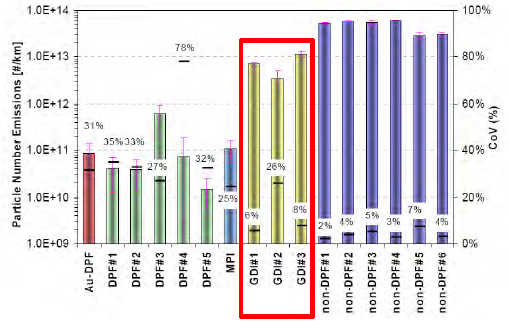Are diesel cars the only polluters?
If we compare diesel cars with gasoline cars, it it true gasoline cars with direct injection (DI) emit greater numbers of ultrafine particles (UFP) than diesel cars with a soot filter. Until September 2017, the EURO6-emission norm for UFP for DIgasoline cars will be 10 times higher than that for diesel cars (6 x 10^12 against 6 x 10^11 particles/km). To remain below the threshold of 6 x 10^11 UFP particles, DI gasoline cars will have to be equipped with a gasoline particulate filter (GPF). In 2014, the automotive sector convinced the European legislators to delay this norm with 3 years, in order to allow for DI gasoline engines to be technically adapted so they could pass the stricter norm by September 2017, without needing the GPF. Whether passing this UFP norm without GPF, even under realistic driving conditions, is doubtful however. Until this norm is attained, we can thus state direct injection gasoline cars are another important source of UFP, as they emit more particles than diesel cars equipped with a soot filter. The figure below, which shows these emissions for the different types of cars, clearly illustrates this.
As such, diesel cars are not the only source of air pollution, also all other types of cars with a combustion engine (CNG,..) emit pollutants. Even electric cars are not 'zero emission' vehicles: they equally cause particulate matter pollution via non-exhaust emissions such as wear of tyres, road surfaces and brakes. In addition, the durability of the electricity required to charge their batteries has to be taken in consideration.

DPF: diesel with filter, GDI: direct injection gasoline, non-DPF: diesel without filter
Source figure: https://www.aecc.eu/wp-content/uploads/2020/08/151027-IQPC-RDE-AECC-RDE-of-a-GPF-equipped-production-car_final.pdf, slide 3
